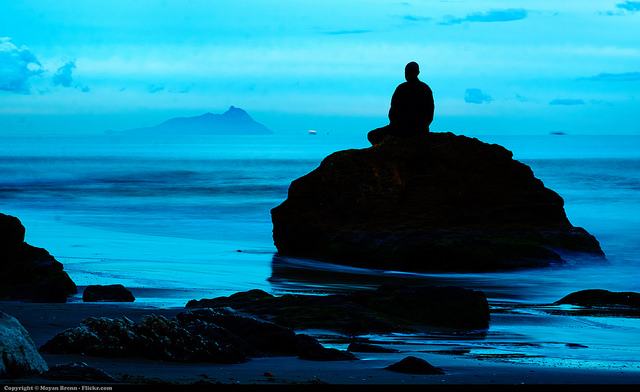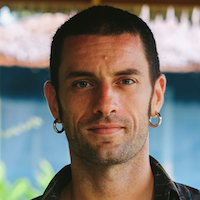A few weeks ago, I spent 21 days practicing meditation in a temple in the north of Thailand.
It was what you would call an “intensive” retreat. I meditated a lot and had a score of deep revelations. And yet, the most profound insight of those 21 days has to do with freedom.
What’s the connection between meditation and freedom, you ask? We’ll come to that. Let me first tell you a bit about this retreat.
My daily schedule was as follows: wake up at 4:00 a.m., meditate until 10:00 p.m., with a pause for breakfast and one for lunch. No cell phone, no books, no talking, reading or writing.
The meditation style was an intensive form of vipassana (insight meditation), the core practice in many Buddhist traditions. Although this may rightfully sound grandiose, the practice in itself is simple. Vipassana is all about bringing awareness, or mindfulness, to whatever one is doing in the present moment. The simpler the activity, the easier it is to bring mindfulness to it.
In this retreat, I was practicing mindfulness in three different activities: mindful prostrations, walking, and sitting. The mindful prostrations are a set of codified movements that help connect the awareness with the body. They only take a few minutes and are an introductory practice to the walking and sitting meditation. In the walking meditation, I would mainly walk back and forth inside my hut (three meters by two), trying to be present and mindful with the movement of my feet, as well as with any thoughts or impressions I had during the walk.
In the sitting meditation, I would simply sit crosslegged, with eyes closed, observing my thoughts, feelings, and bodily sensations.
If you have done any meditation practice, nothing described so far must be very surprising. But sometimes, the most simple practices hide a doorway to profound realizations.
Personally, I had intended to take an intensive meditation retreat for years, but there was something holding me back. Now I know what it was: I was scared of long meditation retreats. I thought that being in silence and withdrawal for a few weeks would be super challenging for me. And you know what? I was right.
By the end of the first week of repeating the same routine, I had moments where my mind was internally screaming, kicking and fighting to find a way out.
I would catch myself counting the days left to the end of the retreat, the hours left to the end of the day, and the minutes left to the end of the hour. Dissect, compare and measure: this is what my mind tried to do. It didn’t work. Believe me, if you have ever thought that “time flies,” a meditation retreat like this will change your mind. Time goes really, really slow when all you can do is meditate.
During those 21 days, I had moments where I felt like a prison inmate, just because I wasn’t “free” to do whatever I pleased. Or, to be more accurate, I wasn’t free to follow every whim my mind: read a book, go on the Internet, get a snack, go for a walk, write down some ideas…
Since quitting was not an option, thought, I had to stay. I had to quiet down my mind and accept the current conditions as they were. And there, in the realization that I had no choice but to accept what is, I found an unexpected realization about freedom.
This is what I said to myself: “Wait a second. If, in order to feel ‘free,’ I need to be able to do anything I please at any given moment, what kind of feeble freedom is that? The slightest change in circumstances can take this freedom away. Being sick, confined, or broke can take this kind freedom away. This can’t be the real freedom.” What is real freedom then?
Real freedom is not the possibility to follow every whim of our minds. Real freedom is the capacity to be in peace with oneself, whatever the external conditions may be.
As soon as I had this realization, everything felt okay. Everything was the way it had to be. The wooden walls of the tiny cabin where I was walking back and forth for hours felt just as spacious as a tropical beach or a remote mountaintop. And what is the difference, really? Wherever we are, the reality around us comes to us through our senses. But freedom is independent from what we see, hear, or smell. Freedom is an inner quality, and therefore it has nothing to do with the circumstances around us.
To put it another way: everything we long for—happiness, freedom, harmony, enlightenment, self-realization—everything is just there, wherever we are. I happened to be in a three meters by two wooden cabin, so that was my temple. that was my universe. All the freedom in the world was there. All the information in the world was there. The meaning of the universe was hidden there, in that cabin, just as it would have been hidden anywhere else I happened to be.
But guess what? These kind of liberating realizations are indigestible for our minds. The mind is constantly moving, and it loves a different kind of temporary, fleeting freedom. The “freedom” that the mind loves is the freedom of never sticking to anything, of getting bored and immediately changing, of “zapping” from one experience to another every few instants.
Superficial freedom, once experienced, brings us to the very realization of its inconsistency. Then, we can have a hint of the deeper freedom, the one that doesn’t depend on any external circumstances, but only on a spacious, unbound awareness of what is.
And this realization may well arrive in a tiny wooden hut, where the only thing you can do is walk back and forth.
Author: Raffaello Manacorda
Editor: Catherine Monkman
Photo: Moyan Brenn/Flickr











Read 2 comments and reply